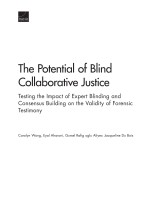| 来源类型 | Research Reports
|
| 规范类型 | 报告
|
| 来源ID | RR-804-1-NIJ
|
| The Potential of Blind Collaborative Justice: Testing the Impact of Expert Blinding and Consensus Building on the Validity of Forensic Testimony |
| Carolyn Wong; Eyal Aharoni; Gursel Rafig oglu Aliyev; Jacqueline Du Bois
|
| 发表日期 | 2015
|
| 出版年 | 2015
|
| 页码 | 39
|
| 语种 | 英语
|
| 结论 |
Expert Consensus Feedback Resulted in Improved Performance- Expert consensus feedback regarding the correct response to the reasoning problem demonstrated the predicted significant effect on response errors: Delivery of feedback resulted in improved performance.
An Advantage Due to Blinding Was Not Observed- There was modest evidence that an expert's mere knowledge of the hiring counsel (prosecution vs. defense) could influence probabilistic reasoning. Increased accuracy tended to be higher in the party least favored by the evidence (the defense, in this case), suggesting a greater motivation to evaluate the evidence critically.
- However, there was no conclusive evidence that blinding experts to their party representation conferred an advantage — accuracy within this condition was only marginally greater than the prosecution condition and not greater than that of the defense.
|
| 摘要 |
- Much more research is needed to demonstrate the real-world utility and feasibility of expert blinding. To the extent that this study's results can be replicated in more naturalistic trial settings, it suggests that greater focus on common threats to sound scientific reasoning (such as base rate neglect) and engagement of the broader scientific community could improve the validity of expert testimony in court cases. In addition, the effect of expert consensus exposure suggests that expert consensus feedback could be a promising way to reduce individual error in expert testimony. Future research is needed to confirm the effect of consensus exposure and to address practical and fairness issues associated with implementing expert consensus exposure approaches in a criminal justice environment.
|
| 主题 | Civil Law
; Criminal Justice
; Criminal Law
; Delphi Method
; Expert Evidence
|
| URL | https://www.rand.org/pubs/research_reports/RR804-1.html
|
| 来源智库 | RAND Corporation (United States)
|
| 资源类型 | 智库出版物
|
| 条目标识符 | http://119.78.100.153/handle/2XGU8XDN/108100
|
推荐引用方式
GB/T 7714 |
Carolyn Wong,Eyal Aharoni,Gursel Rafig oglu Aliyev,et al. The Potential of Blind Collaborative Justice: Testing the Impact of Expert Blinding and Consensus Building on the Validity of Forensic Testimony. 2015.
|
|
文件名:
|
x1495316343762.jpg
|
|
格式:
|
JPEG
|

|
文件名:
|
RAND_RR804-1.pdf
|
|
格式:
|
Adobe PDF
|
除非特别说明,本系统中所有内容都受版权保护,并保留所有权利。